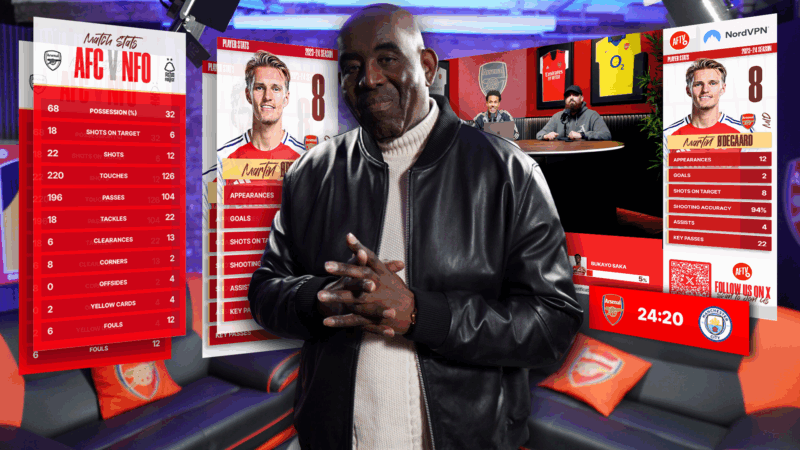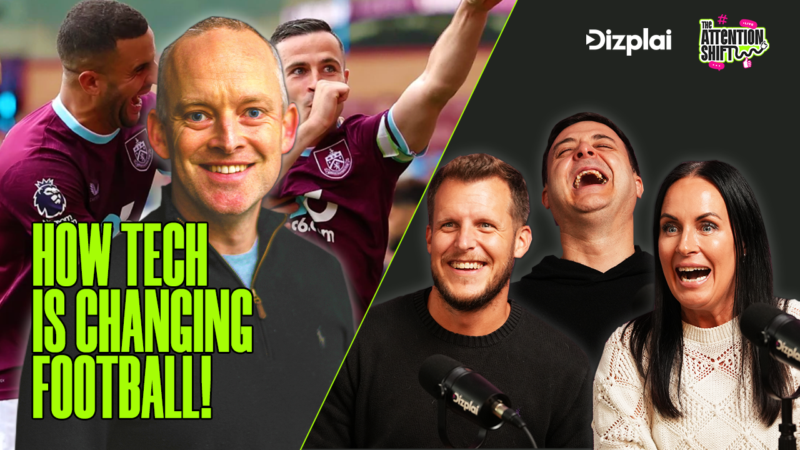
Summary
- Is Your Club Selling Its Soul? Where is the line between global media brand and community asset, and have top clubs already crossed it?
- Plastic vs. Passion? How can clubs convert massive, fragmented international fandom into sustained value without alienating the loyal local fan base?
- The Price of Loyalty: Does dynamic ticket pricing and the devaluation of cup runs prove that local fans are the most exploited customers in the game?
- Can You Trust the Game? Why do so many loyal fans believe football is fundamentally corrupt, and is this loss of integrity hurting the fan experience more than any price hike?
- More Football, Less Fun? Why is the push for commercial over-saturation (like new World Cup formats) actively making fans feel cynical and detached?
- The Wrexham Secret: What is the actual, replicable strategy behind telling local stories that creates global fan engagement, and why aren’t more clubs doing it?
Transcription
I can see the fan’s point of view that football is selling its soul.
As a fan, sometimes I see some things
and it feels like everything is very money-orientated,
but I’m not sure that it’s totally the case.
How do you acknowledge and respect the fact that they’re the lifeblood
and the foundation on which your teams have been built?
Welcome to The Attention Shift,
a podcast where sports media gets debated like a VAR decision.
Passionately, chaotically,
and with none of us fully agreeing on the outcome, right?
Welcome back to The Attention Shift.
I’m Jo Redfern.
I’m Ed Abis.
And I’m Lee Radbourne.
OK, this episode, we’re going to be talking about football.
Oi, oi.
I mean, it comes up quite frequently, doesn’t it?
But…
Sorry.
Here’s the provocation.
Is football selling its soul?
How do clubs and leagues, and even competitions,
balance global fandom with local supporters’ interests,
filling stadia, see, Club World Cup?
Can clubs manage both?
Can you manage local connections, that authenticity?
Can you be a global media brand?
Can you do both at the same time?
Can both coexist?
Who is going to kick us off?
Go on, Ed.
I can see you’re breathing.
Yeah, yeah, yeah.
And bristling…
We’ll come back in ten minutes.
Actually, Ed, I’ll take it.
I can see the fan’s point of view that football is selling its soul.
As a fan, sometimes I see some things
and it feels like everything is very money-orientated.
But I’m not sure that it’s totally the case, right?
You get to see lots of clubs at a grassroots level
where they are the thing that holds the community together.
I know from my own team’s perspective,
every time we’re in the Premier League,
you see things that come out from local councils
and it’s boosting the economy.
And I don’t think that’s football selling its soul, right?
Because it does have that impact on, I guess,
mindsets of people in that local area
and how they feel about their own town or city.
I think there’s more connectivity
when it comes to towns and big cities.
I think it’d be hard to say how,
and I’m sure Manchester City Council do,
how Man United or Man City drives the economy in Manchester.
And I know it does from having worked at Man U
and seeing busloads of people arriving at Old Trafford
to go in the club shop and have ground to it.
So, you know, ultimately there is a tourism play to it.
But I totally understand why people think
that football is selling its soul
because you see some things that go on.
And I think we talked about the Club World Cup, right?
Was that a genuine football play or was that a money play?
And when it happened,
and when you’ve even got people within the game
saying, why the hell are we doing this?
Then, yeah, you could probably understand that.
Are you saying that there’s two parallel ecosystems then?
You’ve got the super clubs.
The haves and the have-nots.
Yes, that can function like global media companies.
And then, I mean, my family,
we’re Stockport County season ticket holders.
That’s not a global media club.
But a club massively on the upright
that we’re doing really, really well.
If I think back when I was watching my team in the 90s,
we had a real rivalry with them.
And then, you know, they went right down to the depths,
went non-league and then slowly but surely,
they built themselves up again.
They come back through.
And I think now, I just wonder as well,
is it any coincidence that Stockport as a place as well
has started to really get almost like a confidence about itself
over the last 10, 15 years,
at the same time the football club has started to rise back up the lead again,
have a confidence about itself as well?
It’d be really, really hard to suggest so,
but it seems a massive coincidence
because I’ve seen, again, my own town have a similar kind of…
Yeah, yeah, and there is definitely that community feeling.
Like I said, I see it firsthand on a weekly basis.
But then, if that is true,
does that also mean that some of the bigger clubs
are losing that touch with the community?
What do you think?
It’s difficult, isn’t it?
Because if you think about clubs like Wrexham,
you know, for example, who now have got a global fan base
or even now Swansea City with like Snoop Dogg investing in them as well,
these are clubs who would have been, you know,
no one would have known about them.
And actually, this is great for them.
This is great for the economy.
And I don’t think they’ve lost their connection with their local fans.
You know, arguably, as a Man United fan,
you know, I’m based down south and I get the stick all the time
for being a Man United fan down south.
Plastic fan.
Yeah, yeah, yeah, plastic fan.
And again, it used to be the case if, you know, like,
it used to be the case, even if you go to Thailand,
they used to all be Man United fans and now they’re Man City fans.
But does that mean you’re less valuable as a fan?
I don’t think it means… I don’t think it does.
I don’t think you can say that it’s just because you don’t live in an area
or you’re global, you can’t turn up every week
even if you get the opportunity.
It doesn’t make you less of a fan.
But going back to does it, you know, is football losing its soul?
I’ve got five shock stats for you.
I’m going to throw you in with stats.
We need to get you a T-shirt.
Least shock stats.
Stattle.
So, 57% of fans believe football is more corrupt than other sports.
And in the UK, and in the UK specifically,
60% of fans believe FIFA has been corrupt in recent years.
Stat two, loyal fans are the most disillusioned.
So, should football care about its fans’ trust?
Apparently, loyal fans rated on integrity,
inherent organisational procedure are more negative about their clubs
than average casual fans.
So, nearly 30% of non-football fans estimated
that nearly 30% of matches are fixed.
Still, that’s crazy.
And then, shot stat three,
women’s football fan base will surpass 800 million fans by 2030,
up nearly 40%.
So, that’s one of the few sports that is growing,
potentially on the flip side,
that has, you know, it’s got its soul still and is doing it.
And, yeah, like, scandals do hurt enjoyment.
43% say scandals reduce how much they’ve enjoyed football
in recent times.
I’d love to understand the context there
of the match fix in particular, shock stat,
because, I mean, I don’t have a feeling of…
I mean, look, it’s like, you watch your game, right?
You watch your team.
And as has happened to us a couple of times this season,
the last-minute goal, the last-minute penalty.
But the reality is, when I watched it, I was like,
yeah, but he was a bloody idiot for handballing it.
Like, it was a penalty.
Like, whichever way you want to look at it.
Where there’s a problem is the consistency, right?
And I’m not getting into VAR and stuff like that.
Do I think that the warper was corrupt?
There’s a betting scandals, right?
Like, you know, Ivan Toner, you’re getting…
I mean, I don’t know.
I wouldn’t say he was match fixing,
but he was definitely betting.
There’s obviously, there was a massive case in Italy,
you know, for a long time where, you know, one of them…
You vendors that got relegated?
One of the big clubs got relegated
because of the match fixing scandal.
So the start…
Calciopoli.
Yeah, the start, there you go, that depts into…
There’s a study called
Should Football Care About Its Fan’s Trust?
And it says, loyal fans rated in all dimensions of integrity,
which was inherent organisational procedure,
so the integrity of, you know,
inherent integrity of a club, for example,
were more negative than the average casual fan.
So, you know, loyal fans estimated that 20…
Said about 20% said they, you know,
they were disillusioned and didn’t trust their club or the league.
And if you think about it,
in an era where conspiracy theories get traction on social media
because they get the most attention,
and also AI making it harder and harder
to spot things that are fake,
really, there’s an opportunity for sport to capitalise on that.
And if we’re talking about football, let’s say football,
because it used to be that that’s one thing
that you couldn’t easily fix
when you’ve got 22 players running around a field,
kicking a football, it’s quite hard to, you know,
to fudge it in a way that you can just generate something with AI,
or you can sit and come up with a tin hat,
tinfoil hat conspiracy theory.
That said, I think it becomes…
It comes under much more scrutiny
when it’s very easy for people to go,
oh, well, they’re clearly on the take then,
or they’re throwing that…
Well, there have been some obvious examples,
but I think, you know,
I think it’s just a combination of everything, right?
It’s a combination of the dynamic pricing,
which was at the Club World Cup,
which is also being done at the World Cup ticketing now.
So the first ticket release was dynamic pricing.
So again, you know, you don’t trust the organisations.
People feel there’s too much of it.
You know, you feel, you know, like, you know,
so the soul of it, you know, again, the Club World Cup,
whether that was a success or not, no-one wanted it.
No-one said,
do you know what we really need this summer
is another football tournament.
And I think that’s part of that sort of like
we’ve talked about before, that sort of commercialisation
and kind of like feel like you’re being rinsed all the time.
So with that, well,
so that takes away from the authenticity argument then,
doesn’t it?
If it’s just more, more, more,
because it’s commercial,
commercial success then is not compatible
with that kind of authenticity, is it?
Interesting. I mean, again, I’ve got stuff as well.
So there was a report I was reading,
and I can’t remember where it was,
but that if the big six clubs continue to alienate
what they call local fan base,
the impact could be as much as 10% hitting revenues
in the long term, so it’s about 221 million.
And that’s just for the clubs alone.
And then obviously that starts to then go down
the pyramid itself.
Now, I know for a fact that the way that Man City
think about their strategy is,
and I don’t know how United think about it rather,
they think, yes, we are a global entity,
but we have to own the local audience.
And they go out of their way to make sure
that they stay very local.
And living in Manchester,
I do see how many city fans you do sort of come across,
and especially where I live,
which is sort of that side or the United side,
there are lots and lots of city fans
in that area that I live in.
And I spoke to people who are United fans who live there,
so they never used to see that when they were growing up.
And the city have really gone out of their way
to try and own that local audience,
because they’re very much aware of this potential problem.
Well, United moved, so, you know,
people have had a season ticket for like over 10 years,
they’ve actually moved them out of their seats
to relocate them so they can have more corporate seating.
You know, and that says it all to you as a fan then,
you know, how much do you mean if that’s…
Yeah, well, I don’t suppose it’s about, sorry,
it’s not necessarily about the fact of moving,
it’s how you move and make it happen.
Or the nuance of how they’ve done that.
And is it a case of they’re not thinking,
I mean, obviously they’re building a new stadium,
but that there’s, you know,
they’re pricing out those local fans
on whom the success of the club has been built
and replacing them with those travelling fans,
corporate fans that are willing to spend a bit more.
Is it not the case that really they need to be prioritising
kind of this longer term value?
The Bundesliga do it really well, right?
The Bundesliga…
Well, they have the 50 plus one ownership rule.
And they also, they don’t charge, you know,
it’s cheap to go and they’ve actively said,
I think it was a Bayern Munich CEO,
I think you may have said this before, Ed,
which was like, he came out and said,
I mean, it’s not in my interest to increase pricing.
Yeah, yeah.
Because, you know, and that’s the sort of actually,
and this is why people feel like football’s losing its soul.
I don’t know if it is, it feels like it is.
And I think it’s coming to that point,
it is coming to a point where fans will stop turning up.
You know, you see all the fan protests about ownership,
lots of different clubs these days,
you know, Sheffield Wednesday at the moment,
having issues with their own.
And it’s just finding it hard.
I mean, you don’t see this though, Jo,
you’re not gaming for example.
No, and it’s interesting
because I’m not as close to football as you two are,
but I look at spaces like Roblox
and see the football fandom that’s evident on there.
But actually, it’s more evident in fan-made games
that aren’t owned by FIFA, they’re not club branded.
Bundesliga has been on there
and Premier League is looking at its strategy on the platform.
FIFA didn’t have a great start on Roblox
and they came away, but they’re rethinking it.
But the most successful football games on there
are ones made by fans.
You’ve got Blue Lock Rivals,
which is the anime football game,
which we’ve spoken about before.
You’ve got street soccer, you’ve got 3v3.
So fandoms alive and well.
And the interesting point,
we were talking about this tension
between community and global success,
you’ve got millions of concurrent players
in those football games
and they’re playing from all over the world.
You’ve got teenagers in North America,
you’ve got a big community that play out of Asia.
They’re all in there because they love football.
So that tells me that there’s a healthy global fandom.
So how do you bring those in?
How do you keep your local fans?
How do you still service them?
How do you acknowledge and respect the fact
that they’re the lifeblood and the foundation
on which your teams have been built,
but actually also have a strategy for those fans.
Not plastic fans.
Have a strategy for those fans
that will only ever be your international fans.
And I don’t think the two are mutually exclusive really.
So actually, this is the opportunity then
to actually lean into that fragmentation, right?
The fragmentation exists.
And we’re not saying local good, global bad, right?
It’s just kind of like it’s…
Both good.
One-on-one and multi-strategies
where you ultimately create different strategies
for different audiences.
So how do clubs start to, again,
really connect with their local audience,
but also then connect with that more casual fan?
Lots of those casual fans might never spend any money with you.
You might never come to the stage.
You might not do anything that impacts you
in any way, shape or form.
Well, they might watch your matches.
They might watch your matches, but is that…
I mean, you could argue, yeah, it is impacting me commercially
because that drives TV rights.
So there is still…
Hard to measure, but there is still that.
But how do you start to create these different strategies
for these different fragmented audiences?
And that’s something that I was speaking about recently
in terms of the old singular funnel
I don’t think works anymore for fandom.
It’s not one fan on one journey.
You’re trying to shove them down to the bottom of the funnel.
If anything, it’s lots of different funnels
in lots of different places.
You can equally have a successful strategy
for your teenage fan base in Indonesia
as your fan base in Salford.
And they still have values.
They bring different value, but actually no less valid.
I think it’s really interesting
how you brought up the plastic fans.
It’s been a while since I heard that terminology.
Because I still do get it as being a Southern United fan.
That implied that it wasn’t real.
It wasn’t solid. It was flimsy and cheaply made.
And I don’t think necessarily you can think about fans
that don’t physically visit the stadium in that way.
I’ve been lucky enough to go a few times to Old Trafford
and I’m lucky enough I’m going to go again in December.
There’s a stat like 99…
For the NBA, for example, they say 99% of fans
will never set foot on the court.
And it’s the same in football.
Take Premier League, for example.
And I think that’s the balance,
which is you want to keep your local community
because they are the things that built it up in the first place,
which made it successful, made it global, made it nationwide.
But I think there is still…
If there’s someone, I know, who’s coming from Thailand or Australia
there still should be an opportunity for those fans to be able to…
There should be a reserve section, if you like,
to say, for an international fan to come over and do it
because it’s a once-in-a-lifetime experience.
Regardless of the result,
there is no better experience than seeing live football.
It’s interesting.
And I think that’s where I think clubs could certainly
lean more into the matchday rituals
that local fans go through and give that a go for the pub.
Because what I don’t see a lot of from a content perspective,
and I talk a lot about this whenever I speak to any club,
once you’ve sold all your tickets on a matchday,
that’s you done, right?
That’s it, yeah.
Try and rinse another £5 out of me for this or for that.
But it’s finite.
But actually to try and take that matchday ritual
and somehow contextualise it from a content perspective
that’s breaking out of that…
Because ultimately you’re not in control of the actual live game itself,
but you are in control of what I call the live moment,
which could be 72 hours, right?
It’s the build-up, it’s the thereafter.
And how you take that feeling of,
look, yes, you can’t put going for a pint,
but you can go behind the scenes with the fans
in those places where the fans are and hear about how they feel,
whether it’s good, whether it’s bad,
give people those kind of experiences.
I don’t see a lot of that.
And we’ve seen a bit of the fan zones abroad as well,
and look how they are costly to put on.
And look, I think the Premier League do a really good job
of doing the ones that they do in the US.
Yeah, the summer series.
That’s probably everything I’ve heard.
They’re brilliant, and one of the pubs in Burnley
actually hosted a pub in Kansas City a couple of weeks ago
and did a really good job of giving that experience.
But again, that’s a very physical experience.
It’s really, really hard to do.
Yeah, arguably we’ve got the technology to do that.
It’s just how do we bring it to bear?
But I think also then,
so when you do those digital global experiences,
bring that back into the whole experience too,
so you’re then connecting the two things together.
Uniting the fans.
The technology’s there to do that.
That’s not that hard to do.
No, it’s not. No, yeah.
It’s probably a good time.
And they tend to keep them like that.
They never bring them together.
Yeah, absolutely.
That feels like a good point for a break.
Yeah, for a hot take huddle.
Can’t wait.
Okay, welcome to our second attempt at hot take huddle.
Slight rule change from last time.
So based on some feedback from producer Will,
you no longer get two minutes
because apparently we all ramble on too long anyway.
So we need to cut some time off the episode.
So 30 seconds it is.
So this week, we’re going to be…
The question is, either side of the debate is,
if a club invests heavily in global marketing successfully,
do local fans benefit or get left behind?
So as I’m a gentleman, ladies first, Jo.
What side of the debate would you like to take first?
I’m going to argue you need to market globally to global fans.
So which will ultimately benefit local fans.
It’s my view and it’s thing…
All right, hang on.
Producer Will, don’t get us in trouble just yet.
Ready, Will and go.
Have a strategy for your global fans
because if you can convert even just a small proportion of global fans,
and again, let’s come back to Roblox.
If you’ve got 23 million users in a game on a Saturday,
if even a small proportion of those spend $1 on a new avatar jersey,
then that’s a huge amount of revenue.
But they’re just as important as the local fans.
I’m going to use that example of Squid Game we were talking about before.
You don’t need to be Korean to…
Quick, I’ll let you finish.
You don’t need to be Korean to empathise with Squid Game.
It’s about the connection of fandom and I think that’s universal.
So I think that there’s a nice strategy for local and global
and let’s figure out how we bring them together.
Two liberties, honestly.
I’d better get the same treatment.
You’ll get fair treatment.
All right, so do local fans benefit
or are they getting left behind if you’re marketing globally?
Ed, ready well?
Let’s go.
I don’t… You know, all this digital distribution of content
and, you know, look, remember me and the local fan.
I want to go down to the pub, I want to walk down to the game,
I want to walk in five minutes before the game,
get my pie and have my matchday ritual
and all of these TikToks and exes and YouTube,
like, they’re just not catering to me and who I am as a fan.
It’s about how I grew up and standing on the terraces
and the smells that emanate from the toilets
that have never been cleaned.
I just feel like I’m spending far too much time
trying to think about fans in Korea
rather than people, actually, from my local area.
I’ll give you some liberties.
I can’t help but think if you live stream that.
People in Korea would really want to watch that.
Well, thanks to Grandad Ed.
I’ll never be able to go to Korea.
He spent his life celebrating YouTube.
Can we get you a body cam for next time, please?
That was brilliant.
I totally hate that viewpoint.
I know you do. I know you do.
I was about to say that.
It goes, everything gets your business, your company.
I’m going to go totally 12 for that one.
I was going to get clipped up.
You were so passionate.
I’m sorry, Joe. I’ve got to give it to him.
I mean, Grandad Ed over here with his flat cat.
I should have brought my flat cat.
I’m always going to lose in a football argument
versus you two. Let’s be honest.
I don’t know, but in a marketing strategy argument,
Joe, I had some face.
You did. But, Joe, some great points in there,
I think, actually, now that leading back into the conversation.
I think you made a really good point about, you know,
if you’ve got, you know, what is it,
one pound or one dollar of your global fan base,
you know, if it’s the top six clubs,
you know, they’re talking like hundreds of millions of dollars.
I think, what’s the stat, Will?
Come on, shout it out.
Oh, that’s funny.
He’s all right when he’s pinging messages.
Exactly. He puts us on the spot with Arthur.
Well, he’ll come back to us with that one, no doubt.
Come back to us, Will. Come back to us now.
But, so, going back to the conversation then,
you know, is football losing its soul?
I think we, I don’t know, where are we on this?
I mean…
I think it’s changing. The market’s changing.
The way that we interact with anything as fans,
whether it’s football, whether it’s, I don’t know, tennis,
whether it’s crochet, whether it’s chess,
it’s changing because of technology
and because of the platforms that we spend a huge amount of our time on.
Therefore, we need to have a bit of a sense check on who our fans are.
Now, our fans did used to be that very finite,
the local ones, they even lived within a certain radius.
There was a geographical boundary to fandom.
Well, that’s gone away now.
That doesn’t mean that they cease to be important.
They still are. And I do buy your argument.
You know, again, I used to go to Millmoor when I was a kid,
stand on the terraces watching Waltham United.
Or my alter ego argument.
They are some of the greatest times that I can remember as a kid.
But now, if you’re Chelsea
and you’ve got a huge number of fans that are willing to engage,
they might not actually show up in the stadium,
but they might watch matches internationally,
they go into your Roblox game, they buy the shirts,
are they any less important to you
than the ones that turn up week in, week out?
I think they have different importances,
but I don’t think really you can prioritise one over the other.
And not to jump on the wrecks and bandwagon, right?
But I think what they have shown,
and look, the storytellers, Ryan and Rob,
what they have shown is that you can tell a local story
to a global audience.
And I know for a fact now, there are a number of football league,
saying to the football league,
we want to be like them, like, yeah,
but you don’t have two guys from Hollywood.
But the point is, if you watch that series,
they’ve found a really good balance
between all the different individuals that make Wrexham what it is.
And that’s really resonated with an audience in the US
who the vast majority have never been to Wrexham,
but lots more are now planning to do it.
So this comes back to the point we were talking about before,
I’m just writing this article about what does universal appeal
even mean these days,
because it’s very different to what universal appeal meant
like 15, 20 years ago.
And with that, I was talking about kids animation.
So kids animated series used to have the edges sanded off
because you wanted it to sell globally.
So the locations of the stories didn’t have cultural markers in them.
You didn’t have obvious accents.
They were usually Western neutral or American
because it increased the chances to sell.
Now, we’ve got Squid Game that’s really popular that came out of Korea.
You’ve got Bluey came out of Australia.
They have very Australian kind of accents and slang phraseology.
What it means is really underneath it,
it comes down to that core of fandom.
What speaks to you as a human, that human connection,
but actually now rather than that sanded down sameness
we were talking about,
that flavor on top only adds to the connection.
So even though I was joking when I said
you should be wearing a body cam when you’re going to get your pie and stuff,
actually, I do think that that is something that people want to identify with.
Hearing Bluey’s Australian slang in a family dynamic
that can be a bit chaotic,
it’s parents and kids just trying to survive being a family,
that actually now deepens the connection.
So the Wrexham thing, I think it’s a case in point,
that’s precisely why it was successful
because there was that storytelling, there was the local flavor.
And some really deep stories like, you know, illnesses and, you know,
like they didn’t talk about the mining disaster and like…
Human connection.
But that’s what makes Wrexham, Wrexham.
And every club has these stories.
The Sandman one did a great job.
I was at a football league event recently and Henry Winter, the journalist,
and I did not realize, right,
the depth that he knew about what’s going on in a football league.
He called out individuals at clubs right up and down the pyramid
who were doing amazing work in their community,
knew them by name, knew the projects that they’re doing.
And it was some projects, you know, some of it was food banks,
but it wasn’t just about that kind of stuff, about homeless people.
I was like, wow, I didn’t realize the amount of stories,
every bit as important as the Wrexham stories, right?
They’re going on across the football pyramid
and it’s not just the small clubs, it’s the big clubs too.
And I think clubs end up in this really difficult position, right?
Because fans complain all the time about losing their clubs.
But they still expect that 100 million signing and titles.
And the reality is, there’s only so many that win a trophy every year.
You can’t have both, right? There’s got to be some kind of balance.
And we talked earlier as well, one other thing I was going to say is,
like, as a football fan, you know,
in terms of this idea coming back to losing its soul,
I really bemoan the fact that clubs outside of the Super 6
don’t go after the cups like they used to.
Because you know what the reality is,
my team is probably not going to win a title.
But to have a cup run and maybe get to the quarters
with that hope that we might get to the semi-finals
and get a game at Wembley,
it’s probably the one thing that I can look forward to in the year.
So if my club, for whatever reason, changes the whole team,
not that I’ve said it happen recently or anything,
changes the whole team, then we go and lose to a team
two divisions below us,
I’m like, well, I’m not going to get to go to the games either.
So I can understand some of these frustrations.
I think that’s it, isn’t it?
You talk about community, like Brentford is my local team,
they do an amazing job around the community.
And actually, like you said about cup runs are really important to fans.
And I think maybe not commercially to a club,
it’s not that viable.
Having a good FA Cup run, for example,
is not, for someone like Maynard,
probably not commercially that important.
Actually getting a Champions League spot is,
but something like that isn’t that important.
And I think that’s the issue at the moment is the…
I don’t think it’s lost its soul.
I think you’re right, Joe, it’s changing.
I think fandom, the way people consume content
and ultimately the attention shift means that fandom has changed.
Football hasn’t caught up with the way that…
Not just football, but sports hasn’t caught up
with the way that attention has changed.
So fandom, its heart has changed being a Spurs fan,
which means its soul is moving because you’ve got new souls,
new younger generations of souls who consume differently.
But then you’ve got this money,
it ultimately feels like a money grab at the moment.
I always mean, I think it’s not…
I don’t think that football as a sport,
whether it’s grassroots, it will always be there.
People will love it. It’s a religion.
That’s why people go to non-league.
That’s why people go down and play 11-a-side or 5-a-side
with your mates because you just love the game.
But what we don’t love is the money grab
because people haven’t worked out how to…
What monetisation is in this modern world
because all their historic ways of monetising are being cut off.
Media writers have gone…
So you talked about soul there, right?
So how do clubs protect their soul
with all the challenges they’ve got going on around them?
Leagues, fans, money, sponsorships.
How do you protect your soul?
We spoke about story.
I think that’s one of the things that maybe a lot of football clubs
feel is a bit low rent or a bit manufactured,
is telling stories.
But inherent in every club is the stories.
You spoke about it, you spoke about it.
Whilst we were off-camera, I was talking about
her windscreen shield in 1996
and how the whole of Rotherham tricks…
You remember the changes for your whole life.
Story, yes. The cup runs, stories.
And that’s what the Wrexham show really brought to the fore.
I don’t think…
That, for me, is an opportunity that football clubs are really losing
and, in a way, would be a way for them to reclaim this kind of…
OK, no, we do acknowledge what the soul of the community and the club is.
We’re going to acknowledge the history,
we’re going to acknowledge the characters.
To your point, the disaster that happened in Wales with the…
Talking about those things, they’re still in people’s memories.
So, actually, if we’re saying that football is selling its soul,
actually, that’s a way to claw it back.
OK, what is at the core of it?
What makes people decide to go and spend some money
and either watch the match or go to the game?
And take away that kind of, like,
we need to just think about maximising revenue
and commercial success on a global level.
I think you’re completely right there, Jo.
I think if I was a club right now, what I’d be doing
is I’d be getting international fans to do some user-generated content
about their matchday experience and their stuff.
They have their own histories.
And they’ve got their own histories
and the history of their fan clubs and their things.
I’d do the same as you rightly talked about with your local clubs.
I’d find your oldest fan, do some storytelling around that.
And, ultimately, that will help protect you as a club or as a league.
And the whole monetisation, whether it’s the Club World Cup
or the dynamic pricing, again, on the World Cup price tickets,
people will vote with their feet in their money.
They just won’t show up.
And then that’s going to ultimately take away
from some of these experiences.
We know from COVID, if you don’t have people in the stadium,
the football is not the same.
And I think that’s what it goes back to.
So, yeah, tell your stories, do the right things,
engage with your community,
but not just on a local and a global level.
And, ultimately, people will vote with their feet and their money
by not showing up.
And I do think you maximise…
..your sport if people have that connection with it.
And that connection can come through those stories.
And you just put me in mind, didn’t somebody from Thailand,
Cycle from Thailand, to the UK to go to a Man United match?
Yeah.
And that story was so compelling.
And I know so many people who started following it.
And then, of course, he got to the ground
and received almost a hero’s welcome.
Well, goodness me, that isn’t the perfect joining together
of local and global.
But similarly, I mean, I’ve seen it down the years.
I have a friend, a guy called Chris Gibson,
who worked for Burnley Football Club for a number of years.
He organised bike rides.
They went to France.
You know, we played Reims in the European Cup back in the 60s.
He arranged the way they rode from there.
And you see more and more fans doing it now, like…
It’s a fair value exchange, right?
The fans want to do things for you.
So really, really lean into it.
And Wrexham have really, really leaned into that.
They saw that the fans felt totally at their lowest ebb,
but they knew there were stories there that they could tell
and they really did it.
And there are plenty of other stories out there.
We can’t all be a Wrexham,
but I think we can start telling those stories better
and feel like the fans are part of the club,
because they are.
And I do think it buys you a bit of grace.
Yes, it does.
If performance falters…
It’s fine making mistakes.
If performance falters,
if those stories have deepened that connection,
you’re going to give them a little bit more grace
and stick with them.
I guess, again, to quote Roger Mitchell…
This feels like a wrap-up.
Yes, it is. To quote Roger Mitchell again,
he said, there’s a lot of investment going into sports
and sports is not an asset class.
And actually, it’s a community asset.
And I think that’s the way you save football,
is ultimately remember that ultimately at the heart of all of this
is football is owned by everyone,
not by the amount of money that you put into a club
or into a league or federation.
And trying to get a financial return on something that…
Ultimately, yes, you might get some sustainable growth,
but you’re not going to get that VC bat 15x that you’re open to.
You don’t have an asset without a fan, do you?
Exactly.
What a nice way to finish, do you?
The greatest asset you could ever have.
Oh, there you go.
Look at this.
Cheering, Elsa.
Right in the feels.
You too, yeah.
Well, I go grab my shit back.
What an emotional note.
No, very true, very well said.
Lovely way to wrap up.
So, like, subscribe, all that fun jazz.
Any good ideas for episode titles?
Email us.
Email us at helloatattentionshift.media.
That’s helloatattentionshift.media.
I’ve been Lee Radbourne.
I’ve been Ed Abis.
And I’m Jo Redfern, and if you got to this stage, well done.
Thank you for sticking with us.
Cheers, thanks, goodbye.
That’s it for this episode of The Attention Shift.
Remember to like and subscribe and listen to us next time.
And do let us know what you think.
Email us at hello@attentionshift.media.
That’s hello@tattentionshift.media.
Goodbye.

- Tags: Brands & Agencies, Broadcasters, Creators, Sports











